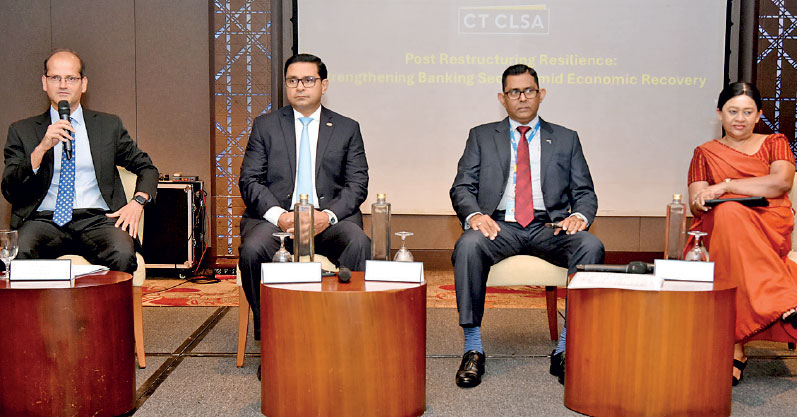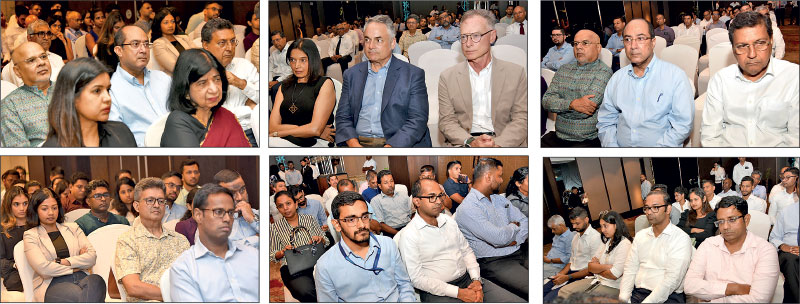Thursday Feb 19, 2026
Thursday Feb 19, 2026
Monday, 16 June 2025 03:26 - - {{hitsCtrl.values.hits}}

Asia Frontier Capital Fund Manager Ruchir Desai (left) moderating the session
By Divya Thotawatte
|
|
|
|
|
|
In a recent discussion, a panel of major local bank representatives stated that Sri Lanka’s future would be one of economic recovery and growth opportunities, yet, policy inconsistency, external shocks, and over-reliance on narrow sectors could undermine its stability.
The banking sector panel discussion, organised by Sri Lankan capital market service provider CT CLSA, titled ‘Post Restructuring Resilience: Strengthening Banking Sector Amid Economic Recovery,’ featured Commercial Bank of Ceylon Managing Director and CEO Sanath Manatunge, Hatton National Bank Managing Director and CEO Damith Pallewatte, and Sampath Bank Managing Director Ayodhya Iddawela Perera. It was moderated by Asia Frontier Capital Fund Manager Ruchir Desai.
They explained that with stable inflation, improved reserves, and GDP growth surpassing International Monetary Fund (IMF) forecasts, Sri Lanka had progressed much since its economic crisis. However, their consensus was that, still, Sri Lanka’s rebound was too fragile for a stable future.
Manatunge said that exceeding the IMF’s predictions on Sri Lanka’s progress and the current stability of inflation, interest, and exchange rates had given the business sector a platform to make decisions with confidence. “If you look at the economic fundamentals, the external sector is doing well.”
He also highlighted progress in fiscal discipline despite challenges, noting that the country had managed to generate a fiscal surplus even though interest rate payments were high. These developments had positively impacted the banking sector, and the resulting resilience had led to impairment reversals, strengthening of profitability, and capital adequacy.
However, political consistency and stability were necessary to maintain this level of growth, despite challenges posed by the global context, Manatunge said.
While acknowledging the positive momentum, Pallewatte also expressed concern, noting: “Interest rates are low. Perhaps it’s bottomed out. Exchange rates are probably stronger than what they should be. So there is potential for and the possibility of depreciation.”
He emphasised the need for policy consistency to attract investment, especially in terms of Port City and the renewable energy industry, considering the huge demand for it and the investments it brought to the country.
Pallewatte further added that within the next 9-15 months, the role of banks would change, urging banks to adapt to new dynamics in interest, inflation, and exchange regimes. He also stressed the importance of maintaining confidence post-IMF. “There is a necessity to bring some consistency into the conversations where confidence is built… that the economy’s ground will continue even after the IMF program is over in 2028.”
Perera, who agreed with the views of the other two panellists, highlighted that cautious optimism for the future was still possible, while acknowledging ongoing challenges. She said that stability would improve with a more consistent policy approach by the Government.
Gaps, risks, and reform
Policy gaps and missed opportunities
With the rapid changes taking place across industries and the world, historical strategies may become irrelevant and not applicable in the present context, said Manatunge.
Highlighting Sri Lanka’s stagnant progress, he pointed out that while Sri Lanka had had 12 industrial zones by 2000, only three more have been added in the last 25 years.
“What kind of Foreign Direct Investment (FDI) encouragement have we created, are we having red tape? We don’t have one single window for these investors,” Manatunge said, contrasting Sri Lanka’s lag with Vietnam and Singapore’s longstanding investor-friendly frameworks.
He also emphasised that frequent regulatory shifts had actively discouraged both foreign and local businesses. He referenced missed opportunities such as a deep-blending plant that went to Dubai and a major sugar refinery that ended up in Saudi Arabia.
He further underlined the widespread informality in business, noting that some small businesses offer 12-13% cash discounts to avoid the 18% VAT. “So, tax money is not coming into the system. Are we going progressively towards collecting taxes and enabling businesses to perform External Commercial Borrowing (ECB), or are we not encouraging investors who have come in and set up?”
Policy inertia and the risk of informalisation
Pallewatte highlighted the Government’s limited facilitation of exports and the increasing size of the informal economy as two main vulnerabilities of the country. He said that despite repeated conversations about building capacity, tangible progress has been minimal. This mismatch between imports and exports left the economy vulnerable to external shocks.
“It can’t be done only with the banking sector. There has to be some support and policy level encouragement coming from the Government. Without that, I think we will end up at the same place.”
Pallewatte also pointed out that complex and punitive tax structures could be pushing businesses away from the formal economy. There was also widespread evasion of digital and traceable transactions by businesses across the country, he said.
“If you go to some parts of the island, you will see they only do business with cash. We always spend and invest on digitising transactions. We bring so much facilitation to bring those transactions into the banking sector and system. But still, we see a sizable amount of transactions happen out of that.”
While acknowledging the role of the informal economy in a small economy like Sri Lanka’s, he warned that the current trend was one of deepening informality. To reverse this, it was important to implement a few reforms that were not overly complex but required political will and follow-through.
Consolidating gains and diversifying risk
Perera highlighted how, despite the improvements of last year, Sri Lanka was highly exposed to external shocks. She explained that while the 5% GDP growth in 2024 post-debt restructuring had been a key success, this growth was fragile.
“We have been relying on certain selected export markets. The country needs to diversify; entrepreneurs need to expand into new export markets and have a portfolio of diversified buyers in the world.”
She said that maintaining consistency in policy resilience to global headwinds would be crucial to sustain momentum. Export diversification was especially critical, she urged, pointing to the apparel sector’s heavy dependence on the US market, with its exports accounting for 50% of sector revenue, and calling for stronger trade ties with neighbouring markets like India, Bangladesh, and Indonesia.
Alongside external market dependence, another major problem was the erosion of skilled labour due to the economic crisis. Perera stressed that the banking and other sectors were still grappling with the brain drain of recent years. Traditional education and training paths may not be fast enough to meet rising demand, and therefore, positioning workforce development and investor confidence were key to sustainable recovery, she explained.
The future of Parate
The bankers also raised concerns over Parate suspensions, warning that recent policy shifts risked undermining repayment discipline and trust in the banking system.
Manatunge explained that while Parate execution had been used to recover only 0.5% of loans, it remained more symbolically and practically important as a legal tool that allowed banks to seize collateral without lengthy court processes.
“In quantity, it is not a big problem. But the issue is, if these policies which have been established 20-30 years back just change, for maybe political reasons or pressure from a minority group, that does not show a very good picture for an industry like banking.”
Both Manatunge and Pallewatte stressed that bigger risks lay in the precedent set. If borrowers believed they could delay or avoid repayment by lobbying for regulatory leniency, it undermined repayment culture.
“It gives the impression even if you borrow, you can stay without repaying if you lobby and push change in the regulation,” Pallewatte said, warning that it led to higher credit costs, penalising responsible borrowers, and increasing the burden on the financial system.
Perera also expressed concern on weakening Parate powers, explaining that it was an issue of economic efficiency rather than just legal authority. While banks remained open to restructuring viable businesses, repeated delays and lobbying served no one, she said. “Faster disposal will also give them some money back to start fresh, revive the businesses, and grow.”
Loan growth gathers pace
The bank representatives also noted that there was a steady uptick in loan demand across a wide range of sectors, driven largely by the revival of Small and Medium-sized Enterprises (SMEs), a rebound in tourism, and early signs of capital investment.
Manatunge said: “As a bank, we have seen loan growth from across all the sectors. Although the loan quantum is small, the number of loans disbursed to SMEs is getting larger.”
Several challenges like the lack of affordable interest rates, raw material sourcing issues, and restructuring programs had held these businesses back. But they were now starting to expand, he said.
Echoing this optimism on SMEs, Pallewatte also added that industrial capacity utilisation was improving. He explained that some industries that had been operating at 40-60% capacity, were now going up to 70-85% capacity. This had driven demand for working capital loans, while the bank looked ahead to more capital expenditure spending. “We would like to see some capacity enhancement in terms of investments in capital expenditure,” he said.
The housing market was also growing, especially in urban areas, where apartment sales had significantly increased, Pallewatte said. He added that credit card and consumption loan usage was also increasing, though longer term investments were necessary for sustainable growth.
Perera emphasised tourism as a key growth area. “Tourism is improving and the refurbishment requirements – all these demand credit. That is an area where banks are supporting at the moment… it is an entire industry community involving hotels, the people, the vegetable suppliers, meat suppliers – all are growing.”
Moreover, there was demand from import substitution efforts, such as pharmaceutical and local manufacturing projects. There was also credit growth in rooftop solar and renewable energy large-scale projects. Barring any external shocks, this credit momentum would continue, she said.
Manatunge added that construction was also a key sector for resurgence. “When the construction sector is booming, there are many economic activities which will flow through, and for banks, it creates a lot of income in terms of working capital, currencies, and commission income.”
Overall, the bank representatives explained that the country could expect stability, underpinned by better SME performances, sector-specific rebounds, and a more stable interest rate environment. “If something extraordinary doesn’t happen, a shock doesn’t happen, we expect the credit growth to continue,” Perera stated.

Pix by Shehan Gunasekara